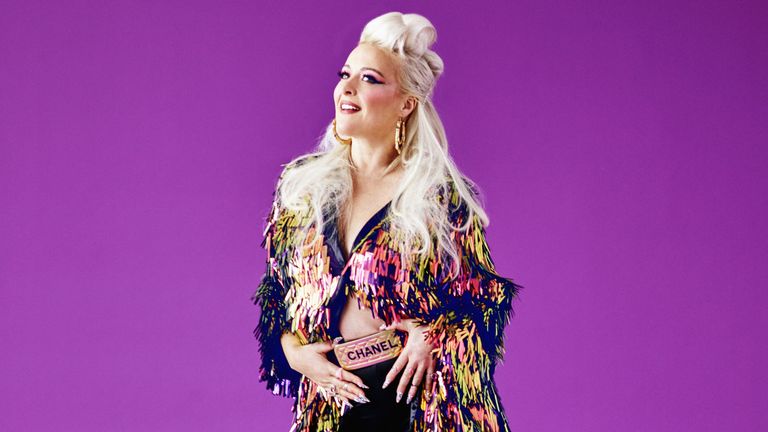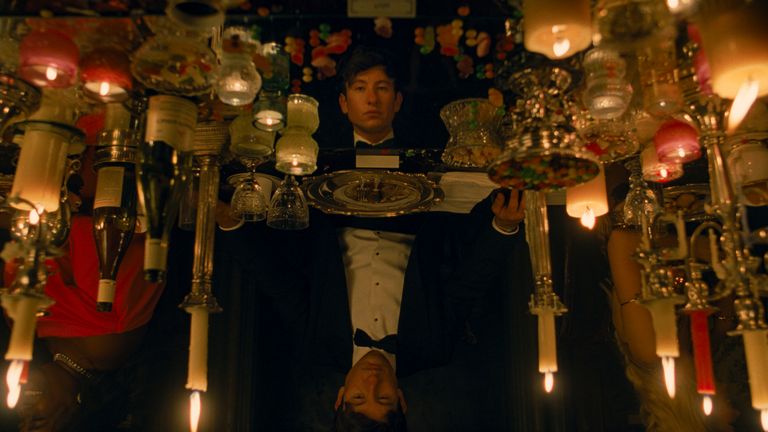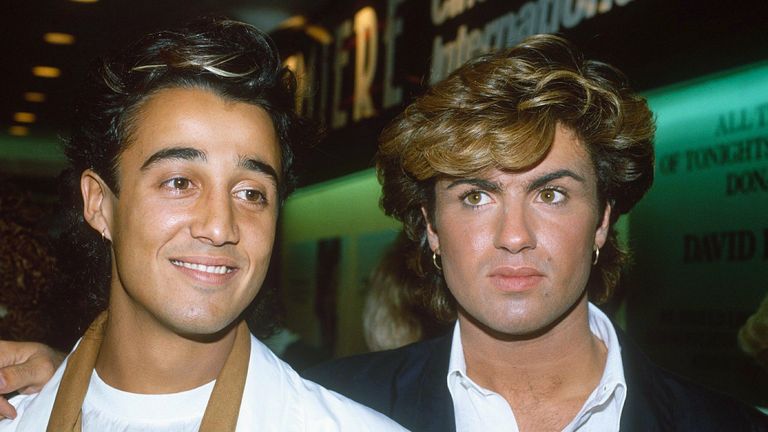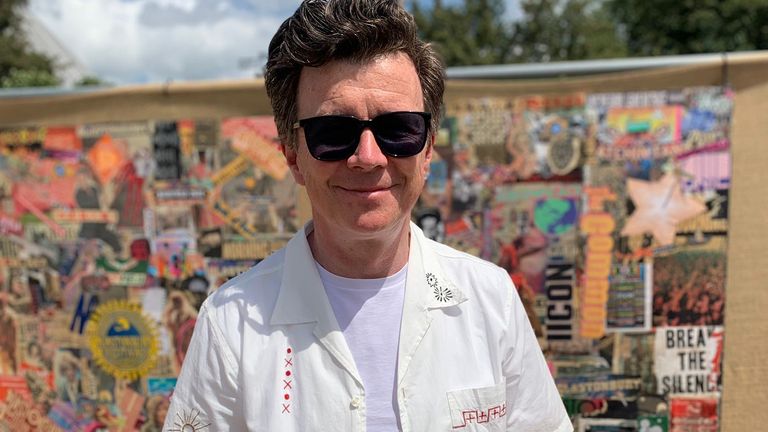“One, two, three, four – let me hear you scream if you want some more…”
Anyone who got within a sniff of a dancefloor in the mid-noughties will know the lyrics, the hypnotic electro beat, possibly the gymnastics-inspired video typical of chart-friendly club tracks of the era (because if it didn’t look like a sexy work-out, were you even making dance music?)
Twenty years later, it’s happening all over again. Princess Superstar’s Perfect returned to the charts in the UK earlier this year – and entered the Billboard chart in the US for the first time ever – thanks to its part in the viral film Saltburn.
“I was like, oh sh*t, that’s my song,” Princess Superstar, aka Concetta Kirschner, tells Sky News, chatting on Zoom on an early morning call from LA. After Saltburn’s release, Perfect was suddenly all over TikTok and Instagram. “I mean, [the filmmakers] had asked for it, but I had no idea what it was going to become.”
Back in the day, it was the mash-up of Perfect with Exceeder, the electro house track by Dutch DJ and producer Mason, which became a hit, and it’s this version again that has found a new audience in the 2020s.
It isn’t the only song revived by Saltburn, which is set around Oxford University in 2006 and features a range of nostalgia-fuelled hits for those of a certain age – from MGMT’s Time To Pretend and The Killers’ Mr Brightside, to Girls Aloud‘s Sound Of The Underground and Flo Rida’s Low. Sophie Ellis-Bextor‘s Murder On The Dancefloor, which soundtracks the final very naked scene (avoid at work/with your parents), rose to number two in the UK chart once again some 22 years after its release.
Read more:
Poor Things to Saltburn: Sex on screen is back
With the entire back-catalogue of pretty much every song ever recorded now available at a phone swipe, it’s a phenomenon that has been happening more and more in recent years – most notably with Kate Bush’s Running Up That Hill topping the chart for the first time ever in 2022 (37 years after its release – a record) thanks to its use in a particularly memorable scene in the hit sci-fi series Stranger Things.
And like Ellis-Bextor, British noughties stars Natasha Bedingfield and David Gray have also seen some of their biggest hits resurrected in recent months; Bedingfield’s 2004 track Unwritten entered the charts again for the first time in 19 years – all thanks to the Sydney Sweeney rom-com Anyone But You – while Gray’s Babylon has become a TikTok favourite.
‘I sort of faded away – now I’ve got record deals coming at me’
For Princess Superstar, the noughties female rapper known for her raunchy lyrics, now married and a mum to a 12-year-old, Perfect (Exceeder)’s newfound popularity isn’t just a nice passing trend – it has relaunched her career. “I never stopped making music, it’s just it never was really popular [anymore], I sort of faded away,” she says. “And then I had a baby and things slowed down.”
The singer, also known for her 2002 track Bad Babysitter, describes Perfect’s second-time-around success as “akin to winning the lottery” for a musician. “I’ve got record deals coming at me, and tours, and all the things I used to do are back again.”
When she was asked if her song could be used in Saltburn, she says she didn’t think about it too much. “I remember not really recognising any of the actors’ names, except for Richard E Grant.” She didn’t get a “tonne of money” for it at the time, she laughs, but she never expected to. “It’s fun to say that because you just think, oh, okay, that’s a cool thing to do, having no idea it would completely relaunch my career.”
Now, she says, she owes writer and director Emerald Fennell a thank you, maybe a fruit basket, Hollywood-style. “I’ve been making music for 30 years, I started in 1995, and I’ve never been on the Billboard charts in the US [until now],” she says. “It’s only ever been the UK and Europe that really embraced me.”
Perfect has now also been remixed by David Guetta, one of the most successful DJs of all time, and her social media sites are filled with appreciation – from young fans who have only just discovered it to those who loved it the first time around. “Back when I was famous last, we only had MySpace – I was everybody’s MySpace song, that’s what they say in the comments of my TikTok. What an amazing world we live in today… that music distribution can happen that way.”
She is pleased for Ellis-Bextor, too. “How amazing – ladies in our 40s and 50s, getting to have that success in pop music is really rare. I love it because I feel like it helps normalise ageing.”
It’s Murder On The Dancefloor… again
Ellis-Bextor, who had already enjoyed a revival in recent years thanks to her kitchen discos held online during the pandemic lockdowns, is now even closer to national treasure status. At the BAFTAs earlier this month, she performed Murder On The Dancefloor in front of A-listers including Margot Robbie, Ryan Gosling and Bradley Cooper.
Like Princess Superstar, she didn’t know much about how the song would be used in Saltburn until she saw it. “I knew it was going to be all of the song and none of the clothes, and that was about it,” she told Sky News on the BAFTAs red carpet. “Naked dancing, count me in!”
Fennell chose songs that perfectly tap into the nostalgia of the era, Ellis-Bextor added. “Music’s so clever, isn’t it? There’s nothing else like music that can transport you through time.”
And unlike some artists who get bored of their decades-old hits, the singer says she has always been on “good terms” with hers. “So for me, this is like an old friend taking me out for another spin… I mean, TikTok wasn’t around when it came out first time around. It’s a real privilege to see how people are interacting with my music. Long may it continue.”
So why is this happening now?
The obvious answer to that question is streaming, and streams being accepted by Official Charts in the UK. But while the resurgence of older tracks does seem to be happening more and more, it isn’t a completely new phenomenon.
“I’m old enough to remember in the 1970s there was a song by Laurel and Hardy which got into the charts called The Trail Of The Lonesome Pine, and that was from one of their films from about 40, 50 years before,” says Martin Talbot, chief executive of Official Charts. “And the first single I ever bought, in fact, was a single by The Goons called The Ying Tong Song, which was re-released in the early ’70s but actually was originally recorded in the 1950s.”
Both tracks became popular once again after being picked up by radio presenters, he says – so much so that the records were repressed and re-released.
“The difference now, and what makes it exciting now and why it gets so much attention, is because these days it’s instantaneous… If you go back to pre-digital, you would have to find a record shop, hope they had something in stock you wanted, then you’d have to buy it and take it home [to play]. There was a big delay with all this stuff.”
Official Charts first started accepting streaming for singles in July 2014, with 100 audio streams equating to one single purchase, and for albums in March 2015. Video downloads and streams were added for singles in 2018, and in January 2023 for albums.
Since then, more and more older Christmas classics have returned each December – with Wham!’s Last Christmas finally charting at number one for the first time in 2020, and at Christmas number one for the first time last year. It also happens now following the deaths of very famous stars.
This still happened, pre-digital, Martin says – it just took a bit longer. “When Elvis died in 1977, and when John Lennon died in 1980, it took a few weeks, two or three months in some cases, for the old tracks to come back into the charts again, because none of those records were available [immediately].
“[Pre-digital] that demand would have to persist and would have to remain for some time for a record label to get around to pressing the vinyl again, pressing the CD, getting into shops. There was a big commitment upfront and investment required to respond to the demand.”
Never Gonna Give Him Up: The revival of Rick Astley
For living artists, or former artists, if their songs get picked up in films or TV shows they can then go viral on social media. And if it’s viral enough it can mean a career revival, as it has for Princess Superstar. Take Rickrolling – the internet phenomenon which started in the mid-noughties, with links posted online for one thing, but unexpectedly directing those who clicked to a video of Rick Astley’s Never Gonna Give You Up instead.
“Rick Astley suddenly came to everybody’s attention for the first time in quite a long time and suddenly became cool with a generation of fans,” says Martin. “With all due respect to Rick Astley – and he would admit this himself – he wasn’t thought of as cool when he first broke through.”
This led to a full Ricknaissance when, last year, the musician performed on the Pyramid Stage at Glastonbury – showing off his talents by throwing in Harry Styles’ As It Was and drumming to AC/DC’s Highway To Hell among his own hits – before performing a surprise set of Smiths covers with Blossoms.
Read more:
Glastonbury virgins: The 2023 stars on their first time
Rick Astley re-records iconic track with wrong lyrics
Now, in an era in which pop is embraced, music is less tribal, and Astley’s talents as a musician are obvious, he has become an icon. “I think music is way less separate and people’s tastes are way more eclectic [now],” Astley told Sky News before his Glastonbury set last year. “I think they’re quite as happy to go and see the biggest rock band in the world, then go and see Elton on the last night, maybe catch someone like myself, you know, at 12 o’clock.”
On the flip side, all this makes it much harder for new artists to break through, says Martin. A rock act today, for example, is competing not just with their contemporaries, but with the greatest of all time, from Deep Purple and Led Zeppelin to Foo Fighters and Queens Of The Stone Age. However, despite the resurgence of old hits becoming more common, the charts boss says he cannot ever envisage a time when the entire Top 40 is made up of them.
“The charts, particularly the singles chart, is all about the youth audience, and every young person wants their own thing,” he says. Because what teenager doesn’t enjoy the rebellion of turning up loud that new band or artist loathed by their parents?
“Absolutely – and so it should be,” says Martin. “That’s what it’s all about.”






